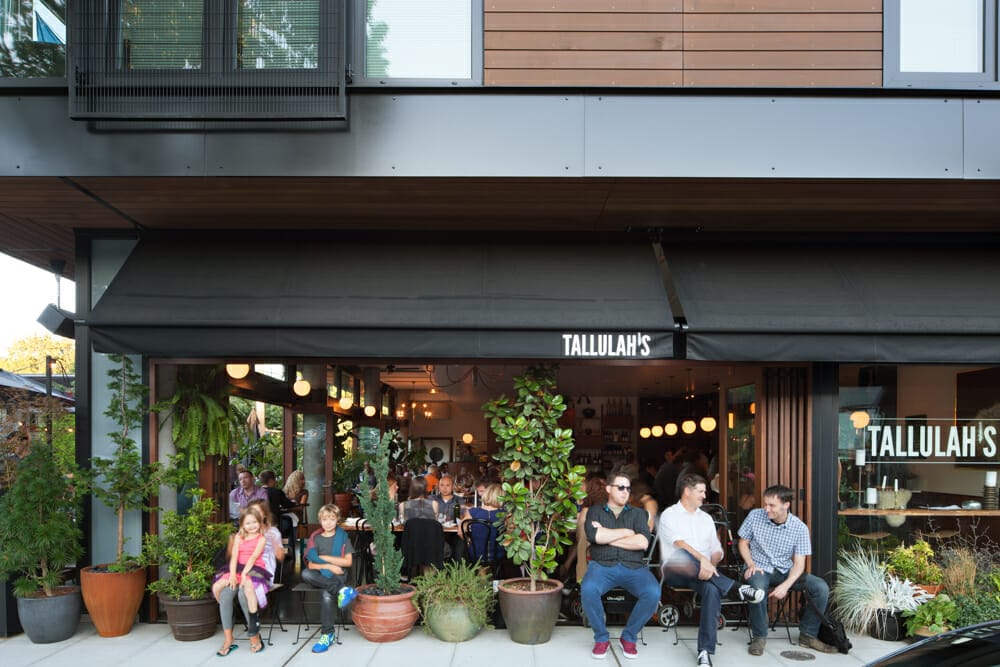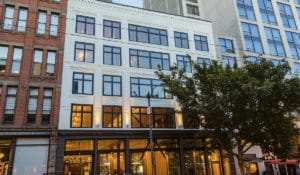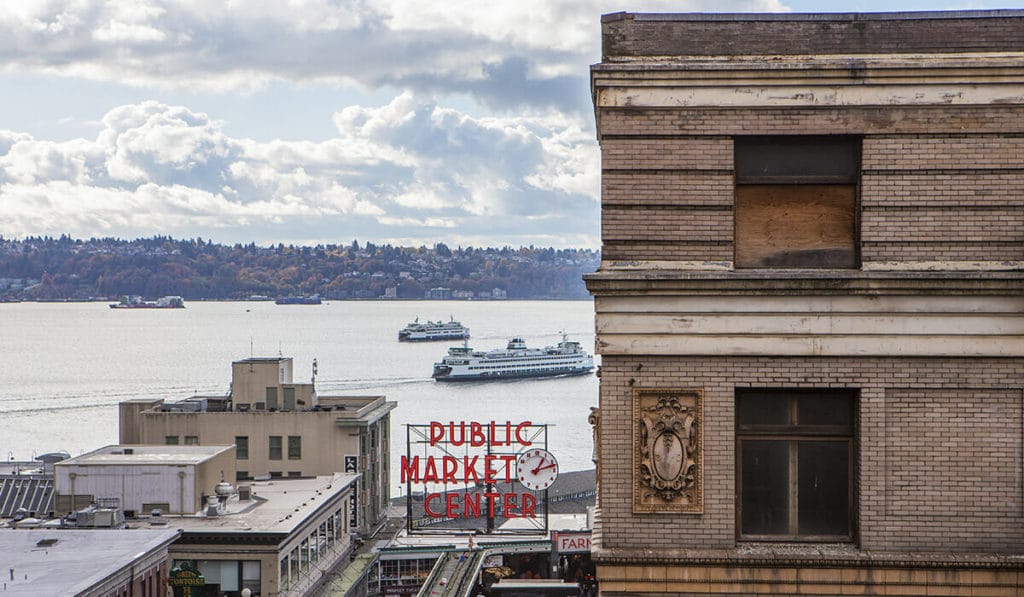Top Story
Name: Joe Ferguson
Company: Lake Union Partners
City: Seattle, Washington, and Portland, Oregon, and recently started a project in Salt Lake City, Utah
Product Types: Core-Seattle neighborhood, mixed-use multifamily
What did you do before you were a developer?
In 2001, I started trying to figure out what my passion was. I’d always told my dad, “Ya know, I’m not going to do what you do.” But as I got older I realized he was an entrepreneur, which is not an easy thing. He had started a construction company early in his career and ran it successfully for over 40 years. The more I matured and the more I looked at that, I realized it was in my DNA. My grandfather had a real estate office, and I grew up playing in his office with the check machine and stapler, but also looking at big permit sets and surveys.
It all came full-circle for me in 2002, two years after I graduated, when I was living in Denver. I interviewed with Grubb & Ellis for a research position that would use the analytical skills I honed through my information-systems degree. I’d been fortunate enough to partner with one of the mentors in my group who’d built up a good book of business. I’d support him by running our pro forma analysis and help him pitch deals. Then I met my soon-to-be wife and decided Seattle was the place to go.
I’d increasingly been interested in real estate development. We were the generalists at Grubb & Ellis, and I had the chance to work with clients who were acquiring land for redevelopment. I saw the creative nature in that profession. So I tried to figure out how I could break into development even though it was not my expertise.
I went back to one of my core strengths—analytics—and went to work for Matthew Gardner, a land use economist here in Seattle. And it was a great entry for me into the Seattle market and into the development world as well.
After two years of being very hungry to get out into the field, I met Chad Barron and Ben Rankin with Pioneer Development who had essentially bootstrapped their company. By the time I came on, I was tasked with building the development team of the company. They didn’t have anybody specific to development, so my task was to fill the deal pipeline. It was a combination of creating an investment strategy and locating investment opportunities. It was this good balance for me of these skills I’d built up to this point, both on the brokerage and analytical sides.
Our business plan was to convert heritage buildings into condos. Sometimes it was a pretty small construction scope, but most often it was a full gut and redo. I got my feet wet with project management and construction management, and got to learn alongside some great people. Also at the time I had met my current business partners.
Fast-forward to ’08, we were seeing some serious weakness in the business plan, and by October we were closing the doors. So by the end of that year, my future business partners and I were talking through the opportunities that this enormous “reset” presented.

19th & Mercer is a 50-unit multi-family mixed-use building in Seattle’s Capitol Hill Neighborhood. The building is anchored by an impressive mix of Seattle’s most celebrated local retailers fronting 19th Avenue East, providing a lively amenity for residents and the neighborhood as a whole.
By early ’09, we formed Lake Union Partners (LUP), with a focus on urban development and infill —Neighborhood-scale projects with a combination of multifamily and mixed-use retail. By 2011, the market had started to catch up with us. So really, for that two-year period, survival was considered success. Thankfully we had planted enough seeds, and worked through enough collaborative relationships, that by 2012 and 2013 we were quickly ramping up the number of projects we were working on, hired some fantastic team members, and started looking at scale. We’re nimble, and we like to pivot into different market types and locations as those opportunities come about.
What motivated you to make the leap into development?
If I’d stayed in Denver, and not moved to Seattle in 2005, it would have been a slower road for me. The urgency wouldn’t have been there. Working in brokerage, I was essentially hitting the reset button anyway, because I was building up a new book of business and building those relationships, which can take years. With that kind of reality in front of me, moving to a new city, I realized that if there was a chance to make a switch, then this was it. Our brokerage business in Denver was doing well, and we were scheduled to close some big deals, and so if there was one thing, for me it was this constant reminder to follow your interests. It sounds trite, but follow your passions. And don’t be afraid to make the jump even when you’re comfortable where you are.
In dealing with the day-to-day operation of your enterprise, what do you find to be most difficult to accomplish?
I’d say trying to figure out the day-to-day, week-to-week, month-to-month pipeline and strategy, in which way we are going to steer the boat. You could easily chase dead ends, so I think both individually and as a company, we’ve worked hard to refine feasibility conclusions early on. You don’t want to get stuck in one strategy, because the market is going to move without you, but it’s important to have different disciplines and to be able to say no to deals, because that’s your number-one resource—your time.
Where do you turn to get a fresh perspective or experienced insight on a prospective or existing deal?
I’ve been working with the Runstad Center at the University of Washington, which is the real estate school. I’ve enjoyed the fresh perspective that comes with students, and at some level you are learning alongside them.
Last spring, I was asked to be an associate fellow. I was paired with a nonprofit housing developer, two professors, and two graduate students. We were tasked to study the resilience of cities—which is, of course, a very broad topic—and we came up with ways to make that topic relevant. It was a nice complement to our firm’s goal of making affordable and workforce housing, and that’s increasingly our focus in part because I was with these other associate fellows, so we decided that that’s what we wanted to study—affordable housing and impacts on open space in communities.
We went to Santiago, Chile, and Curitiba and Rio de Janeiro, Brazil, and we got to interact with a bunch of professors, developers, architects, and land use planners and think through what’s working and what’s not. Obviously, you’re talking about cities that have completely different economies than the United States, but we were able to build themes and lessons learned. Thankfully, my business partners saw some value in that and let me off the hook for a couple weeks. It was a good experience.
What gets you out of bed every day to do what you do?

LUP developed The Standard Building, an office building located in Seattle’s Central Business District, just blocks from Seattle’s waterfront. The rehabilitation strategy focused on maintaining the existing character of the building for creative office use and a restaurant on the ground floor.
I like the problem solving, and the creative puzzle that comes with information systems. In real estate, you’re constantly trying to solve problems.
The people side of the business is fun. As a developer, you’re constantly at the center of it all. You’re putting together teams for each project and engaging with folks who are in the neighborhood and the community, and business leaders and politicians. Across these disciplines, we navigate mutual benefit whenever possible.
At the end of the day, everything that ULI stands for—building where there’s access to transportation, and making affordable places for people to live—makes me proud to know that I’m doing something that’s supporting the city’s growth.
What does being a successful real estate developer mean to you?
Obviously, many times success is tied to financial performance, which is certainly a focus. You have to build a company that can sustain multiple cycles in the market and achieve some staying power in the hopes of having a successful real estate development company in the long term. For us, we’re here for the long term. That was a driving focus early on.
I think success can be defined as being proud of what you do. Whether it’s in Seattle, Portland, Salt Lake [City], or even back to Denver, where we hope to be working in the near future. We’re part of the community, and we can drive by our work and be proud of what we’ve done in that it’s complemented the built environment and the fabric of the city.
Anytime a developer can collaborate with other folks, and achieve those similar goals, whether with landowners or other developers, I think that’s powerful, because you bring different perspectives. Ultimately, if you’ve achieved success for the whole team, then it’s a better project for those efforts.
In looking at the next one to two years, what do you see as the biggest challenges to your business and projects?
I’d say right now the inflationary environment is proving challenging. The cost of construction has hit a point where something’s got to give, whether it’s the cost of capital and reducing the returns required for the investment, or potentially the land values need to come down.
What’s interesting to watch here in Seattle is that the mayor and city council are struggling with figuring out how to provide an incentive for the private-market developers to participate in the production of affordable housing. After going on that trip as an associate fellow, I came back feeling like developers must be part of the solution. We can’t just write checks, and the city then gives that money to nonprofits and rely on nonprofits to build the housing. It has to be a collective effort, and there has to be the economics to support an incentive. I’m curious how we address that in the coming years.

LUP is repurposing this historic 7-story Eitel Building, located just one block from the Pike Place Market, into an independent hotel with 90 guest rooms. The ground floor will be anchored by a signature restaurant at the prominent corner of 2nd Avenue and Pike Street.
What skill or trait did you lack at one point, and how did you overcome it?
One of my most challenging classes at Colorado [University] was accounting. [Laughs.] I work well with numbers. I like logic. I am comfortable with Excel and can build a pro forma or put together that financial analysis, but for whatever reason I could never get that balance sheet to zero.
When we started our company we saw in each other what we wanted for the firm. The four of us have a complementary skill set. We made it an equitable partnership. A dollar comes in, and we split it four ways. It allows us to focus and be more efficient with our strengths. One of my partners has gravitated toward those accounting processes. It’s not unlike development, where you focus on what you’re good at and outsource the rest.
What was a memorable mistake?
We had a project at the early stage of construction where we had just started excavating the site. At this site we knew we had lenses of groundwater, but we learned from our geotechnician that during the excavation we had pulled the glacial till cap of an underground aquafer. When that happened, our hole filled up with 15 feet [4.6 m] of water. We had to hit the brakes and completely redesign the foundation and figure out how to increase the weight of the building and work through the permit approvals for discharging water into the sewer.
We look back on that, and we try to learn from what questions did we not ask at the time, or what scope of work we could have included in our diligence. But construction is always risky to some degree, so it’s not going to be without its challenges. Just making sure you’re trying to learn from those mistakes, which will keep you here in the long term.
Whom do you most admire?
I can probably list a bunch of professional inspirations, but at the end of the day it’s my wife. When we first got together, we made each other better. It was this palpable experience, this super power. She’s an entrepreneur as well, and a lot of times I will come home with a question, and she provides clear advice because she can see the world so clearly. I just feel fortunate every day to have her as my partner.
What’s your favorite city to visit and why?
It’s got to be New York. We’ve had great visits out there. It’s so dynamic, and there are so many people, and yet there’s still a hospitality that exists. New York gets a bad rap for being grumpy and short, but I’ve had only great experiences and I love Central Park.
My daughter is an eight-year-old second-grader, and they just elected three city planners in her class. The teacher put this whole program together, and they do this each year. They’re designing a mock-up town, and they’re trying to figure out where the school goes, and where the sewer goes, and she asked me, “Daddy, do you think I should run for city planner?” And I told her that if that sounds fun to her, then go for it, and sure enough she wrote a speech, and we learned just a couple of days ago that [chuckles] she got elected as one of the city planners. Part of her idea was a central park, and this priority for open space. So that brings me back to New York. It’s fun to see the power that experiencing New York had for her. It’s a passion of ours to travel and bring inspiration back to our work.
About Entrepreneur Profiles
Entrepreneur Profiles are conversations with real estate development professionals who, in most cases, have recently made the leap into the industry whether as young individuals fresh out of school or as mid-career transitions.
With a focus on small-scale developers often doing incremental and transformative work, these are quick and easy to read profiles to raise awareness of these professionals. By telling their stories, the Urban Land Institute hopes to inspire the next generation of small scale entrepreneurs to transform their own communities. See the most recent Entrepreneur Profiles.